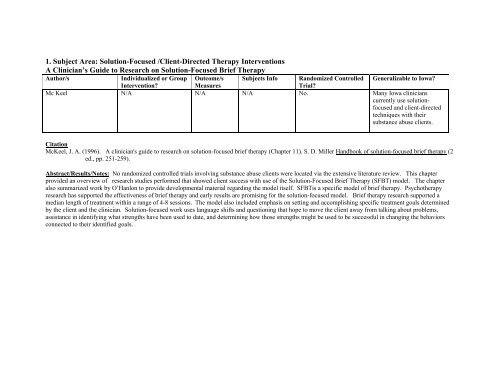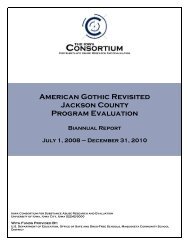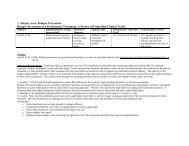1. Subject Area: Solution-Focused /Client-Directed Therapy - Iowa ...
1. Subject Area: Solution-Focused /Client-Directed Therapy - Iowa ...
1. Subject Area: Solution-Focused /Client-Directed Therapy - Iowa ...
- No tags were found...
Create successful ePaper yourself
Turn your PDF publications into a flip-book with our unique Google optimized e-Paper software.
<strong>1.</strong> <strong>Subject</strong> <strong>Area</strong>: <strong>Solution</strong>-<strong>Focused</strong> /<strong>Client</strong>-<strong>Directed</strong> <strong>Therapy</strong> InterventionsA Clinician’s Guide to Research on <strong>Solution</strong>-<strong>Focused</strong> Brief <strong>Therapy</strong>Author/sIndividualized or Group Outcome/s <strong>Subject</strong>s Info Randomized Controlled Generalizable to <strong>Iowa</strong>?Intervention?MeasuresTrial?Mc Keel N/A N/A N/A No. Many <strong>Iowa</strong> clinicianscurrently use solutionfocusedand client-directedtechniques with theirsubstance abuse clients.CitationMcKeel, J. A. (1996). A clinician's guide to research on solution-focused brief therapy (Chapter 11). S. D. Miller Handbook of solution-focused brief therapy (2ed., pp. 251-259).Abstract/Results/Notes: No randomized controlled trials involving substance abuse clients were located via the extensive literature review. This chapterprovided an overview of research studies performed that showed client success with use of the <strong>Solution</strong>-<strong>Focused</strong> Brief <strong>Therapy</strong> (SFBT) model. The chapteralso summarized work by O’Hanlon to provide developmental material regarding the model itself. SFBTis a specific model of brief therapy. Psychotherapyresearch has supported the effectiveness of brief therapy and early results are promising for the solution-focused model. Brief therapy research supported amedian length of treatment within a range of 4-8 sessions. The model also included emphasis on setting and accomplishing specific treatment goals determinedby the client and the clinician. <strong>Solution</strong>-focused work uses language shifts and questioning that hope to move the client away from talking about problems,assistance in identifying what strengths have been used to date, and determining how those strengths might be used to be successful in changing the behaviorsconnected to their identified goals.
2. <strong>Subject</strong> <strong>Area</strong>: <strong>Solution</strong>-<strong>Focused</strong> /<strong>Client</strong>-<strong>Directed</strong> Brief <strong>Therapy</strong>/Brief InterventionsA Strengths Perspective for Social Work PracticeAuthor/sIndividualized or Group Outcome/s <strong>Subject</strong>s Info Randomized Controlled Generalizable to <strong>Iowa</strong>?Intervention?MeasuresTrial?Weick, Rapp, Sullivan,and KisthardtN/A N/A N/A No. Yes. Decreasing the stigmaof SA treatment can beassisted by focusing onsolutions and strengths.CitationWeick, A., Rapp, C., Sullivan, W. P., & Kisthardt, W. (1989). A strength's perspective for social work practice. Social Work, 350-354.Abstract/Results/Notes: The historical roots of helping professionals were embedded in negativity, focusing on problems, identifying blame, and belief in lackand weakness. The concentration on human failing and moral frailty led the field for many years before any empirical call for professionalism. The language ofthe field (intervention, pathology, and diagnosis), still continues the notion that a cause must be found in order to find a cure without the benefit of a guaranteedsolution.This article was written early in the philosophical conversation and encouraged the field to shift its perspective to examining strengths and survivor skills that aclient brings to their current situation. The article examined the barriers that might exist between client and environment and helped the client examine theirnatural strong points, in an effort to build efficacy and empowerment. The authors maintain that clinicians whose core beliefs coincide with a strengths-basedperspective, still battle with a system that looks for cause, effect, return on investment, and a system still set up for intervention.
3. <strong>Subject</strong> <strong>Area</strong>: <strong>Solution</strong>-<strong>Focused</strong> /<strong>Client</strong>-<strong>Directed</strong> Brief <strong>Therapy</strong>/Brief InterventionsParadigm Lost: Model-Driven to <strong>Client</strong>-<strong>Directed</strong>, Outcome-Informed Clinical WorkAuthor/sIndividualized or GroupIntervention?Outcome/sMeasures<strong>Subject</strong>s Info Randomized ControlledTrial?Miller and Duncan Iindividual interventionsare mentionedData studiesfrom psychotherapeuticliterature.Generalizable to <strong>Iowa</strong>?N/A No. Yes. Scott Miller trainingshave been offered in <strong>Iowa</strong>over the last several years.CitationMiller, S. D., & Duncan, B. (2000). Paradigm lost: From model-driven to client-directed, outcome-informed clinical work. Journal of Systemic Therapies, 19(1),20-34.Abstract/Results/Notes: This article described an overview of solution-focused/client-directed models of therapy. Although such models are withoutrandomized controlled trials, they are supported in the clinical field. The article examined data connected to client strengths, beliefs about change, theclient/therapist relationship as a collaboration, and individual hope and expectancy for success. This model also supported the move to strengths-based work thatshifts from a problem orientation to what convinces a client that productive change can be made.<strong>Iowa</strong>’s Department of Public Health has funded trainings by Scott Miller for working with substance abuse clients over the last few years and his support forclient-directed therapy has been well-received. Language creates challenges for acceptance as some clinicians interpret client-directed to be client-run (as is thecase with Motivational Interviewing), but many addiction field members find a home in the respectful process of simply asking clients two things: 1) are yougetting what you think you need and what you came here for and 2) is the therapist providing what you need/want to achieve your treatment goals?Brief therapy supports the contention that the client should perceive positive change and achievement toward goals in the first few sessions, and if that is nottaking place according to the client, the staff should evaluate a different approach for the client. Structure and content remain important components, but theclient-therapist relationship must be a process that moves forward for the client and not solely based on what the clinician need to have happen.
4. <strong>Subject</strong> <strong>Area</strong>: <strong>Solution</strong>-<strong>Focused</strong> /<strong>Client</strong>-<strong>Directed</strong> Brief <strong>Therapy</strong>/Brief InterventionsIs it Time for Clinicians to Routinely Track Patient Outcome? A Meta-Analysis.Author/sIndividualized or GroupIntervention?Outcome/sMeasures<strong>Subject</strong>s Info Randomized ControlledTrial?Lambert, Whipple, N/ANo.HawkinsMultipleoutcomes in ameta-analysisof patientfocusedresearchsystems.<strong>Client</strong>s aremonitored andscales are used todetermine risk oftermination.Generalizable to <strong>Iowa</strong>?Yes. Could benefitretention and engagementneeds for providers.CitationLambert, M. J., Whipple, J. L., Hawkins, E. J., & et al. (2003). Is it time for clinicians to routinely track patient outcome? A meta-analysis. Clinical Psychology:Science and Practice, 10(3), 288-30<strong>1.</strong>Abstract/Results/Notes: Lambert supported Scott Miller’s client-directed model. Patient-focused research systems monitor and feed back data about a patient’sprogress during therapy to enhance outcomes. A review of three larger-scale psychotherapeutic studies suggested that formally monitoringpatient progress has a significant impact on clients who show poor treatment response in early sessions. Once poor response is identifieddeterioration of that response can be reduced and treatment outcomes can be improved. The monitoring questionnaires are formal and structuredand indicate when changes need to happen in the client-clinician relationship to avoid termination from treatment.
5. <strong>Subject</strong> <strong>Area</strong>: <strong>Solution</strong>-<strong>Focused</strong> /<strong>Client</strong>-<strong>Directed</strong> Brief <strong>Therapy</strong>/Brief InterventionsOutcome-Informed Clinical WorkAuthor/sIndividualized or GroupIntervention?Outcome/sMeasures<strong>Subject</strong>s Info Randomized ControlledTrial?Miller, Duncan and N/AHubbleGeneral overseveral theoriesand modelsfrompsychotherapyliterature.CitationMiller, S. D., Duncan, B. L., & Hubble, M. A. ((In press)). Outcome-informed clinical work.Generalizable to <strong>Iowa</strong>?N/A No. Yes. Promising work thatmay improve retention andengagement of clients andclinicians in the therapeuticprocess.Abstract/Results/Notes: Miller and Duncan continued their discussion of the need for outcome-informed clinical work that includes client evaluation of theprocess as optimal for successful treatment work. Miller and Duncan argued the need for clinicians to be more concerned about the therapeutic relationship andwhether or not engagement has moved treatment forward than the support of any particular model.
6. <strong>Subject</strong> <strong>Area</strong>: <strong>Solution</strong>-<strong>Focused</strong> /<strong>Client</strong>-<strong>Directed</strong> Brief <strong>Therapy</strong>/Brief InterventionsMesa Grande: a Methodological Analysis of Clinical Trials of Treatment for Alcohol Use DisordersAuthor/sIndividualized or GroupIntervention?Outcome/sMeasures<strong>Subject</strong>s Info Randomized ControlledTrial?Miller, and Wilbourne N/A Varied Multiple studies Over 70% of the studiesoutcomes and subjects. included were RCT’s.dependent onstudy reviewed.Generalizable to <strong>Iowa</strong>?Somewhat. Strongestefficacy found for briefinterventions, social skillstraining and communityreinforcement approaches.CitationMiller, W. R., & Wilbourne, P. L. (2002). Mesa Grande: a methodological analysis of clinical trials of treatments for alcohol use disorders. Addiction, 97, 265-277.Abstract/Results/Notes: Miller and Wilbourne reviewed 361 controlled studies (over 70% of which were randomized controlled studies).Brief interventions, motivational enhancement, and behavioral training/management therapies, including community reinforcement approaches dominated the topten list of treatment methods supported by controlled trials. Results support the importance of paying particular attention to client’s social network, social skillsdevelopment, community reinforcement and marital therapy.Abstract/Results/Notes: Miller and Duncan continued their discussion of the need for outcome-informed clinical work that includes client evaluation of theprocess as optimal for successful treatment work. Miller and Duncan argued the need for clinicians to be more concerned about the therapeutic relationship andwhether or not engagement has moved treatment forward than the support of any particular model.
7. <strong>Subject</strong> <strong>Area</strong>: <strong>Solution</strong>-<strong>Focused</strong> /<strong>Client</strong>-<strong>Directed</strong> Brief <strong>Therapy</strong>/Brief InterventionsThe Efficacy of Motivational Interviewing: A Meta-Analysis of Controlled Clinical TrialsAuthor/sIndividualized or GroupIntervention?Outcome/sMeasures<strong>Subject</strong>s Info Randomized ControlledTrial?Burke, Arkowitz and Individual interventions.N/AMencholaGeneral overseveral theoriesand modelsfrompsychotherapyliterature.Not all. This is a metaanalysisof controlledtrials some withrandomized and other not.Generalizable to <strong>Iowa</strong>?Yes. Promising work thatmay improve retention andengagement of clients andclinicians in the therapeuticprocess.CitationBurke, B. L., Arkowitz, H., & Menchola, M. ( 2003 October). The efficacy of motivational interviewing: a meta-analysis of controlled clinical trials. Journal ofConsulting and Clinical Psychology, 71(5), 843-86<strong>1.</strong>Abstract/Results/Notes: Adaptations of Motivational Interviewing (AMI), were equivalent to other active treatments and moderate effects compared with notreatment and or placebo were reported for drug and alcohol interventions. The article reviewed research focused on the individual delivery of the four basic MIinterventions developed by Miller and Rollnick of expressing empathy, developing discrepancy, rolling with resistance, and supporting self-efficacy. Moderateefficacy was reported. Fifty-one percent (51%) of clients who received AMI treatment were improved at follow-up compared with 37% of those receiving notreatment or treatment as usual.“...there have been no empirical tests of a “pure” form of motivational interviewing, as defined by Miller and Rollnick (1991, 2002), that have not beenconfounded by feedback or other clinical strategies. At this point, we do not know whether feedback, motivational interviewing, or the combination is essentialto produce a therapeutic effect.”






